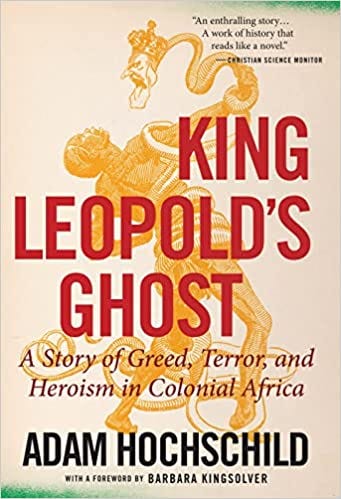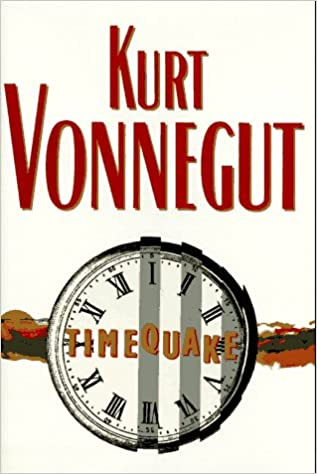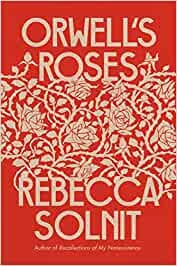So how was your summer? I didn't post much, but I did read some, various formats: paper book, audio, Kindle.
The Eden Express by Mark Vonnegut (1975)
Time Quake by Kurt Vonnegut (1997)
The Handmaid's Tale by Margaret Atwood (1985)
All the Lives We Ever Had: Seeking Solace in Virginia Woolf by Katharine Smyth (2019)
Ordinary Grace by William Kent Krueger (2015)
Their Eyes Were Watching God by Zora Neale Hurston (1937)
Best Young Woman Job Book by Emma Healey (2022)
King Leopold's Ghost by Adam Hoschschild (1998)
Role Models by John Waters (2010)
Some of these titles I read in the spring, but, you know, recent enough.
First, King Leopold's Ghost. I had a copy of this two decades ago. I don't remember how I came to have it. It seemed to me a book I "should" read, but my interests were always elsewhere. I loaned it to my father. He read it, admired it. Eventually, I let go of my copy in some move or book purge, but I never forgot it, and in the past couple of years I've been catching up on "books I've always meant to read." One was Joseph Conrad's Heart of Darkness (1899). Of course, I "studied" Heart of Darkness in university, but I only read about 20 per cent of it. After I read it to the end, I thought I really need to read King Leopold's Ghost, and now I would say everyone "should." What a prosecution of murder, mayhem, colonial entitlement, and genocide, which he then connects to contemporary anti-slavery movements.
I enjoyed Their Eyes Were Watching God, another off the long list of "books I've always meant to read." Zora Neale Hurston (1891-1960) wrote novels about the African American culture of the rural South and was associated with the Harlem Renaissance, an artistic movement (c. 1918–37) that "sought to reconceptualize 'the Negro' apart from the white stereotypes that had influenced Black peoples’ relationship to their heritage and to each other" (Britannica; accessed Sept 25, 2022).
Ordinary Grace was a title selected by my neighbourhood book club. Despite being a New York Times Bestseller, it received mixed reviews by the group. From me, thumbs down. Too neat, too simple, too stocked with, well, stock characters.
All the Lives We Ever Had was part of an ongoing project of mine to engage more and deeper with the work of Virginia Woolf. I thought this title might provide an interesting opening. I mean, I guess it did, but it was more about the author than Woolf. The author's father dies, though not suddenly and not tragically. Might be harsh to say, but not every death is grand-scale-tragic, though on the micro scale the loss is deeply felt by the author. More to the point, perhaps, is tremendous sadness the father carried for many, many years, regarding his unfulfilled potential as an architect — and also the prolonged bitterness between the author's parents. Solace is hard to identify here. More pronounced is the lingering sadness of banged up lives.
Best Young Woman Job Book is an account, non-fiction, of a banged up life. Emma Healey is a Canadian poet and now memoirist, as well as a one-time blogger. One blog post about her relationship with a creative writing professor at Concordia University, while she was a student there, went viral, at least in Canlit-connected social media circles. It crossed my screen, and it crosses the pages of this book, though in far less detail than in real life (IRL). The book is framed as a series of jobs — technical writer for a porn company, TV writer, poet-living-on-grants — and told as a coming-of-age tale. Both of her parents are writers and in high school she decides this is her path, too, but it's a path pocked with more trolls under bridges than any young person ought to expect. Did I like it? I wanted more challenges overcome than hardships endured, more hard insights gained than — well, whatever.
The Eden Express is subtitled A Memoir of Insanity, and boy is it ever. Mark Vonnegut is son of Kurt Vonnegut, and one story may illustrate how that goes: Mark was once asked what it was like to grow up the son of a famous novelist, and he replied that when he was young his father sold used cars. The fame and fortune came later, around the time Mark was a young man in the late-1960s ... eager to "drop out" of the expectations of mainstream life, Squaresville, USA. In short, he was a hippie, though he completed his degree in religious studies and managed security for a hospital while waiting for his girlfriend to complete her degree, so they could ... move to Canada and avoid the Vietnam War and all the rest of "straight life" by buying a farm in British Columbia. Getting back to the land and setting themselves free, as Joni Mitchell put it. Them and tens of thousands of other unique individuals. Anyway, the farm gets bought and the commune established and Mark persists in seeking the ideal with such fervor that his brain cracks. He's diagnosed with schizophrenia, though in an afterward to the 20th anniversary edition he notes that today his illness would probably be framed as bipolar disorder. He is hospitalized three times, heavily medicated, and leaves the farm. Later, he attended Harvard Medical School and became a pediatrician, which he remains. I hope he is a better doctor than a writer, because this is not a well-written book, though it is illuminating. It has all of the jargon of the era, can you dig? And remarkably lucid descriptions of conversations with friends, lovers, and fellow commune-livers. Best Young Man Job Book?
Okay, Time Quake. I listened to this as an audio book, and I would have liked it to have been read by Kurt, but his prose is so distinct, he's there. I also recently watched the documentary Vonnegut: Unstuck in Time (2021). I hope someone does another one, because this one was awkward and too much about the filmmaker himself, though it was revealing about certain family dynamics, and it highlighted Vonnegut's assertion about the importance of "extended families." This wasn't something I associated with Vonnegut, but it comes up repeatedly in Time Quake, which also serves as a Vonnegut memoir of sorts. Key elements of Vonnegut's biography have been integrated into his fiction. This is no surprise. If Vonnegut hadn't lived through the Allied bombing of Dresden in World War II, there would have been no Slaughterhouse Five (1969), for example. But in Time Quake, we get a reflective Vonnegut riffing across all stages of his life, while telling the tale of how the world stopped in 2001, suffering a "Time Quake," wherein it (and everyone in it) was forced to repeat the years 1991-2001 verbatim. As in, everyone did everything exactly as they had done before, all over again. The loss of free will became dangerous when the 10 years ended, and folks like bus drivers didn't realize that they actually had to assert control over their vehicles again, brake and steer, or drive into whatever they were previously pointed at. Time Quake implements the gamut of Vonnegut tricks, and I'll call it, sure, a major work. Vonnegut shows the world in its full absurd glory, and he yearns for the simple things, his lost extended family primarily, his deceased siblings, and the easy dreams of his early life. So it goes, pal.
Finally, The Handmaid's Tale. Yes, I hadn't read this before, though I had seen the movie, script by Harold Pinter (1990), back in the day. I haven't seen any of the TV series. Can anything new be said about this book? I was surprised by how it took me back to the 1980s, the assumptions and attitudes of that decade jumped out in how Atwood described and framed the plot and characters. It's a very "white" book, as I've read in recent criticism. Intersectional feminism isn't Atwood jam, at this stage of her career, anyway. What we do get, though, is Atwood's notorious irony wound tighter than ... well, what? Jimmy Swaggart's ego, maybe (seeking a 1980s reference). For one, no one would mistake Offred as a stand-in for the author. Offred's situation is tragic, for example, but she is also often dim, never a word one would apply to Atwood. For another, I was surprised that the most pointed satirical barbs are pointed at the female enforcers of the new militaristic order. This is a novel primarly (secondarily?) about lateral violence, it seemed to me, female-on-female violence enabled and enforced, yes, by the male dominated social framework. But the men in the book seem too stupid to pull off such a coup. The Commander undermines the Order's own rules, and Nick, the driver, bends and twists in whatever way best curries favour. The women are the truest believers and the owners of the hardest hearts. Atwood 101.
Role Models, the audio book, is read by John Waters, which is good because he gets his own jokes, often subtle in the intonation of his chosen words. The book is essentially a memoir by Waters, notorious Baltimore filmmaker of filth and saccharine, except it enables the author to tell the story of his life through the filter of those he most admires, individuals ranging from the famous (Little Richard, Johnny Mathis, Tennessee Williams) to the obscure or otherwise hyper-marginal (Esther Martin, owner of the scariest bar in Baltimore) to the infamous (Manson Family member, Leslie van Houten). Waters gives book recommendations, gushes about the pleasures of hanging out in dangerous bars, seeks out now impoverished porn filmmakers, and time and again gently teases his "upper-middle class" straight-laced parents, who long ago stopped wondering where he came from. One time, in hospital without the mascara pencil he needs for his pencil moustache, he directs his mother to please bring one: "We never spoke of it again." This is, overall, some tale. Waters is a giant of delicate decorum and a highly gifted storyteller. These, however, are not the gifts that mark him as a true original; that talent is his ability to re-centre the margins. It's social Star Trek for the suburbs. The ability to reveal where few (though thousands) have gone before.
What now? What books have I got on the go?
The book club's latest is The Dalky Archive by Flann O'Brien (1964).
I've made initial forays into Orwell's Roses by Rebecca Solnit (2021), In the Margins by Elena Ferante (2021), and I Had A Father by Clark Blaise (1993).
Looking forward to Exhalation by Ted Chiang (2019) and The Dawn's Watch: Joseph Conrad in a Global World by Maya Jasanoff (2017).
Ciao.







Always enjoy wat you have to say! Books I've read and those I haven't.